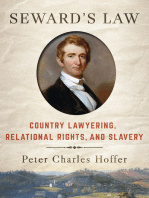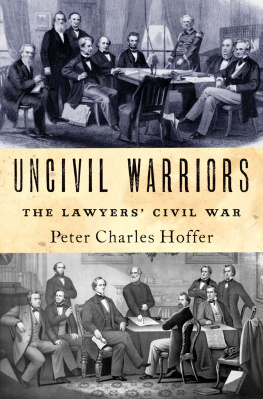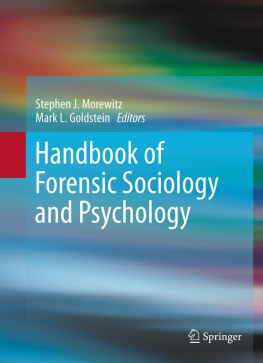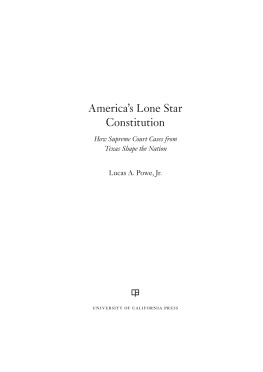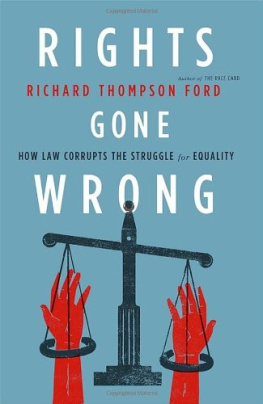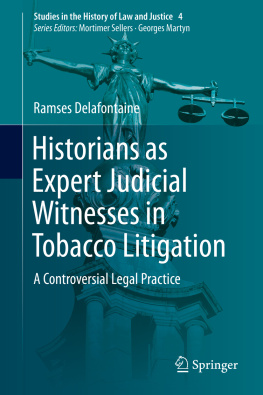Contents
Guide
THE SCHOLARLY AND PROFESSIONAL literature on litigation in America is vast, but space allotted for this bibliographic essay is limited. I have included all sources used in this book, along with some suggestions for further reading. Page numbers following the entries below are the sources of specific information in the text, in lieu of notes.
The primary (original, contemporary) sources in the book come from legal documents in manuscript or printed form. One should note that the law cases from the seventeenth and eighteenth century, whether printed or still in handwriting in record books, rarely include more than names, dates, and legal terms. The underlying evidencethe real-life stories of the partiesdoes not make it into this historical record, although some courthouses and archives retain the file papers lawyers gave to clerks and depositions taken out of court. In the end, one has snapshots of what was at stake.
The printed volumes of state and federal appeals courts reporters (court-hired archivists/clerks) introduced at the end of the eighteenth century in the United States reveal somewhat more of the facts of the cases. Even these accounts were limited because the reporters were publishing what counsel submitted to the courts of appeals. The full accountswhat the parties said and the evidence they produced at the trial stage of the casedid not make it into the courts of appeals reports, although sometimes they survived in file papers at the courthouse. When newspapers began to cover trials, a fuller account in real time was preserved. This was true of the second half of the nineteenth century and after, because the papers sent a different kind of reporter, a journalist, to sit in the gallery and take notes. Finally, when recording devices in court became common, the most accurate record of trial court proceedings emerged. Even so, these almost exclusively concerned criminal trials. Civil suits rarely made the media. All of this means that the excerpts of cases in the pages above come primarily from reports of courts of appeals.
On law in America generally, see Peter Charles Hoffer, A Nation of Laws: Americas Imperfect Pursuit of Justice (Lawrence: University Press of Kansas, 2010), xiixiii and after; John C. Coffee Jr., Entrepreneurial Lawyering: Its Rise, Fall, and Future (Cambridge, MA: Harvard University Press, 2015), 7, 1213, 5960; and Lawrence Friedman, A History of American Law, 3rd ed. (New York: Simon and Schuster, 2007), as well as the articles in Christopher Tomlins and Michael Grossberg, Cambridge History of Law in America, 3 vols. (New York: Cambridge University Press, 2008). On lawyers and styles of lawyering, see Deborah L. Rhode, Lawyers as Leaders (New York: Oxford University Press, 2013), 1222, and Robert D. Dinnerstein, Client-Centered Counseling: Reappraisal and Refinement, Arizona Law Review, 32 (1990): 501604, quotation on p. 501. On judging, see Richard Posner, How Judges Think (Cambridge, MA: Harvard University Press, 2010), 12526, and Robert M. Cover, Violence and the Word Yale Law Journal, 95 (1986): 160130, quotation on p. 1601.
INTRODUCTION: LITIGATION AND HONOR
Federal case loads from http://www.uscourts.gov/statistics-reports/federal-judicial-caseload-statistics-2017. Although criticism of overloaded state and federal dockets was a staple of American court life going back at least as far as the Gilded Age, the literature on the litigation explosion exploded with the publication of Randy M. Mastro, The Myth of the Litigation Explosion, Fordham University Law Review, 60 (1991): 199216, quotation on p. 199, a response to the media embrace of Walter K. Olson, The Litigation Explosion: What Happened When America Unleashed the Lawsuit (New York: Dutton, 1991).
Figures in the text for the Upper Midwest in the nineteenth century are taken from J. Gordon Hylton, The Wisconsin Lawyer in the Gilded Age: A Demographic Profile, Wisconsin Law Review, 1998, 76576, figures on p. 768. Additional figures for civil litigation in U.S. trial courts appear in Caseloads, Civil Cases, Private, 18731917, Federal Judicial Center, http://www.fjc.gov/history/courts/caseloads-civil-cases-private-18732017. Other statistical studies put the United States behind modern European nations; Koen Van Aeken, Civil Court Litigation and Alternative Dispute Resolution, in Comparative Law and Society, ed. David S. Clark (Cheltenham, UK: Elgar, 2012), 22123; Marc Galanter, More Lawyers than People: The Global Multiplication of Legal Professionals, in The Paradox of Professionalism: Lawyers and the Possibility of Justice, ed. Scott L. Cummings (New York: Cambridge University Press, 2011), 69.
The notion that litigation is a matter of broken cultural understandings and feelings of harmed honor is the centerpiece of Peter Charles Hoffer, Law and People in Colonial America, 2nd enlarged ed. (Baltimore, MD: Johns Hopkins University Press, 1998), 7685, from which the above pages are extracted. On Mechelle Vinson, see Meritor Savings Bank v. Vinson, 477 U.S. 57 (1986). The entire story is told in Augustus B. Cochran III, Sexual Harassment and the Law: The Mechelle Vinson Case (Lawrence: University Press of Kansas, 2004).
PART I: LITIGATION DEFINES A NATION
Quotation on revolutionary lawyers comes from Peter Charles Hoffer and Williamjames Hull Hoffer, The Clamor of Lawyers: The American Revolution and Crisis in the Legal Profession (Ithaca, NY: Cornell University Press, 2018), 15253.
CHAPTER 1: DEFAMATION
For background on the first English settlers, see James Horn, Adapting to a New World: English Society in the Seventeenth-Century Chesapeake (Chapel Hill: University of North Carolina Press, 1994), 14, 16, and David Grayson Allen, In English Ways: The Movement of Societies and the Transferal of English Local Law and Custom to Massachusetts Bay in the Seventeenth Century (Chapel Hill: University of North Carolina Press, 1981), 4.
On defamation in America generally, see Norman L. Rosenberg, Protecting the Best Men: An Interpretive History of the Law of Libel (Chapel Hill: University of North Carolina Press, 1986).
For various cases involving defamation in the early colonies, see T. H. Breen, Imagining the Past: East Hampton Histories (Reading, MA: Addison-Wesley, 1989), 11437; Mary Beth Norton, Founding Mothers and Fathers: Gendered Power and the Forming of American Society (New York: Knopf, 1996), 3034, 84, 21114; Thomas L. Haskell, Litigation and Social Status in Seventeenth-Century New Haven, Journal of Legal Studies, 7 (1978): 21942, figures at pp. 22930; Susan Juster, Sacred Violence in Early America (Philadelphia: University of Pennsylvania Press, 2016), 174; Clara Ann Bowler, Carted Whores and White Shrouded Apologies: Slander in the County Courts of Seventeenth Century Virginia, Virginia Magazine of History and Biography, 85 (1977): 41126; David Konig, Law and Society in Early Massachusetts (Chapel Hill: University of North Carolina Press, 1979), 8182, 9697, 184; Dale J. Schmitt, Community and the Spoken Word: A Seventeenth-Century Case, Journal of American Culture, 13 (1990): 5155; and Roger Thompson, Holy Watchfulness and Communal Conformism: The Functions of Defamation in Early New England Communities, New England Quarterly, 56 (1983): 50422.
The literature on witchcraft in the American colonies is vast, but a few of these books especially focus on the social context of accusations. Eunice Coles case is taken from David D. Hall, Witch-Hunting in Seventeenth Century New England: A Documentary History 16381692 (Boston: Northeastern University Press, 1991), 21329. Other sources are John Demos,


